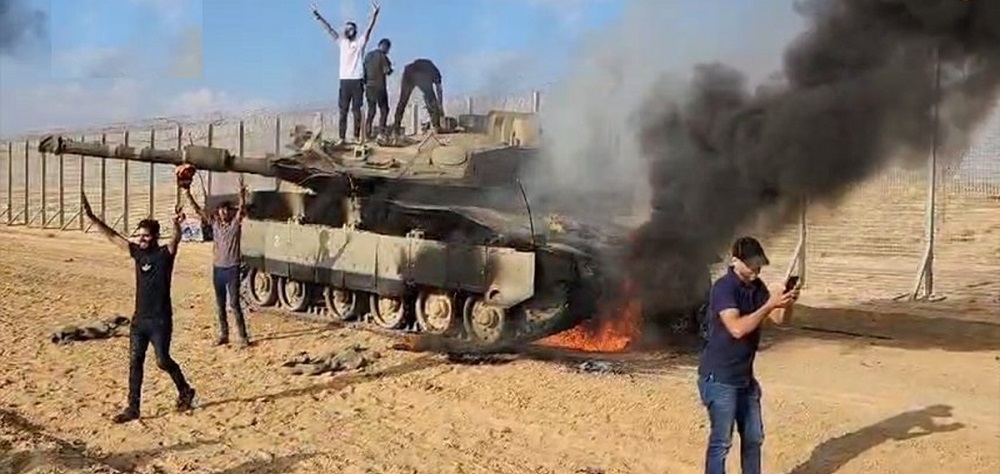Having postponed the ground offensive to occupy Gaza several times under various pretexts despite the preliminary threats, the Israelis over the past few days and hours have started their moves to begin the ground operation.
But on the opposite side, along with the heightened Israeli attacks on Gaza, the Axis of Resistance has their determination to respond resolutely. Beside Hamas voicing its readiness to counter the Israeli forces in a ground war, there have been sporadic clashes on the Lebanese borders with the Israeli regime and also attacks have been launched on the American bases in Syria and Iraq, heralding stormy days.
Given the fast-moving developments in the region, Alwaght has talked to Saadullah Zaree, a senior analyst of Palestinian and Israeli affairs, for a picture of the latest Gaza conditions.
Q: How likely do you see a massive ground offensive on Gaza? What is you predictions in case this happens?
Zaree: The Israelis expressed their intention for a ground invasion of Gaza since the first and second days, but since there were differences between the government and the military, it has not been launched yet. Besides, the Americans have been afraid of failure of the offensive and believe that as long as adequate intelligence are not gathered on various aspects, the ground attack should not take place. So, just contrary to the belief that there are differences between the US and the Israelis over the ground operation, there is no difference on the very operation and the difference is on its time and quality. Also, there are signs showing that the Americans do not trust the Israeli power and military system, and also there is no confidence inside Israel in the ground offensive. So, now the decision maker about the operation is the United States. So, as long as the military intelligence vacuum is not filled, the operation will be kept delayed.
The consequences are clear to a large extent. The Israelis in the past had such an experience. In ground operations, the classic forces cannot make success against the guerrilla fighters, and the Americans cannot change this reality with larger number of forces, as they said that they have deployed 2,000 additional forces to the region. The Resistance camp essentially has a upper hand in the ground war. Israel has the superiority in air operations and that is because of their advanced equipment. But it is otherwise when it comes to ground operations, and the force that holds the land, has guerrilla fighters, has tunnels, and has the population balance in its favor has the upper hand. So, I’m certain that the ground offensive against the resistance will sustain a big defeat, even bigger the defeat the Israelis suffered on October 7.
Q: Yesterday, Palestinian Authority President Mahmoud Abbas strongly attacked Hamas leaders. What do you think are the goals behind these stances by Abbas? How do you see the performance of the Palestinian Authority in the current war?
Zaree: Actually, Abbas is defending a position he lacks in Palestine. According to the experience of the Palestinian nation Abbas is part of an Israeli mechanism, so, he takes an opponent stance for being seen in this battle. Since Abbas has no place in the Resistance camp and other cases, his remarks do not matter so much.
But amid the revolt in the West Bank and the death of 120 Palestinians in this part of Palestine over the past two weeks, Abbas has been given a mission to calm the situation down in the West Bank. However, the anti-Israeli activism in the West Bank is expressive of the fact that he is incapable of controlling the situation and people advance their own battle against the occupation.
Q: Along with the threats by the US president, media talked about attacks on some resistance positions in Syria. Are there any further information and details of these attacks? Do you foresee a broader confrontation between the Axis of Resistance and the US as a result of Gaza war?
Zaree: If the United States responds in Syria, or if they have responded, their situation will be far worse because the Resistance camp has no intention of stopping short of attacking American positions, and because Washington is Israel’s accomplice and even leading the crimes against the Palestinian people these days, naturally every American blow is answered with several blows.
Regarding the second question, if the enemy’s operations are intensified, the resistance operations will also be intensified in parallel. But in general, as much as possible, the parties try to control the range of the conflict. Therefore, although the policy of the Resistance front is not to expand the war, if the opposite side expands it, the Resistance front will respond to the same extent.
Q: One of the most possible developments in the war is expansion of the war to the northern front on the border with Lebanon which is already inflamed. Is Hezbollah weighing up entry to the war? Has the decision been made and it is only a matter of time? Should Hezbollah step in, can Israel fight on two fronts?
Zaree: It should be said that it is not just the northern front that is active and there are other fronts that over the past few days showed face by conducting launches. So, the fronts are not limited to Hezbollah.
But Hezbollah has also practically entered the war. It has launched operations several times in the past weeks, and this means entering the war. Israel is struggling on the first front and suffers losses, so, on other fronts, its losses will be broader.
Q: Given the Israeli threats, how do you see Hamas future?
Zaree: With the operation it conducted, Hamas has
built itself a central role in the Palestinian case for a long time, and
from now on, it will be a determining factor in the Palestine
equations.
/129

